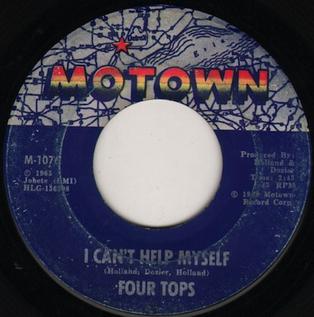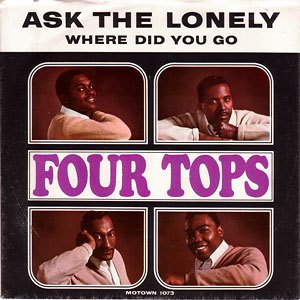Related Research Articles

Albert George Hibbler was an American baritone vocalist, who sang with Duke Ellington's orchestra before having several pop hits as a solo artist. Some of Hibbler's singing is classified as rhythm and blues, but he is best seen as a bridge between R&B and traditional pop music. According to one authority, "Hibbler cannot be regarded as a jazz singer but as an exceptionally good interpreter of twentieth-century popular songs who happened to work with some of the best jazz musicians of the time."

"Sir Duke" is a song composed and performed by Stevie Wonder, from his 1976 album Songs in the Key of Life. Released as a single in 1977, the track topped the U.S. Billboard Hot 100 and Black Singles charts, and reached number two in the UK Singles Chart, his joint biggest hit there at the time. Billboard ranked it as the No. 18 song of 1977.

"I Can't Help Myself " is a 1965 hit song recorded by the Four Tops for the Motown label.

"I Can't Stop Loving You" is a popular song written and composed by country singer, songwriter, and musician Don Gibson, who first recorded it on December 30, 1957, for RCA Victor Records. It was released in 1958 as the B-side of "Oh, Lonesome Me", becoming a double-sided country hit single. At the time of Gibson's death in 2003, the song had been recorded by more than 700 artists.
"Do Nothing till You Hear from Me" is a song with music by Duke Ellington and lyrics by Bob Russell. It originated as a 1940 instrumental that was designed to highlight the playing of Ellington's lead trumpeter, Cootie Williams. Russell's words were added later. In 1944, Ellington's own recording of the song was a number one hit R&B chart for eight non-consecutive weeks and number six on the pop chart.
"I'm Beginning to See the Light" is a popular song and jazz standard, with music written by Duke Ellington, Johnny Hodges, and Harry James and lyrics by Don George and published in 1944.
"Don't Get Around Much Anymore" is a jazz standard written by composer Duke Ellington. The song was originally entitled "Never No Lament" and was first recorded by Duke Ellington and his orchestra on May 4, 1940. "Don't Get Around Much Anymore" quickly became a hit after Bob Russell wrote its lyrics in 1942.
"Things Ain't What They Used to Be" is a 1942 jazz standard with music by Mercer Ellington and lyrics by Ted Persons.

"When She Was My Girl" is a 1981 single released by American vocal group the Four Tops. The song, their first release off Casablanca Records, helped to return the former signature Motown act to the American pop Top 40 charts, peaking at number 11 on the US Billboard Hot 100, number 10 on the Cashbox chart, and reaching number one on the R&B charts.

"Love Ballad" is a song by R&B/Funk band L.T.D.. Jeffrey Osborne is the lead singer.

"Ask the Lonely" is a soul/pop ballad recorded by Motown singing group the Four Tops. Released as the group's third single, the single became the group's second successful single ever since signing to Motown in 1963. Released in 1965, the song rose to number 24 pop and number 9 R&B. It's notable for it being co-written by longtime Motown staffer Mickey Stevenson as most of the group's hits on Motown were written and produced by Holland-Dozier-Holland. It's also notable for lead singer Levi Stubbs' emotional lead and The Andantes helping the other Tops in the background.
"Flamingo" (1940) is a popular song and jazz standard written by Ted Grouya with lyrics by Edmund Anderson and first recorded by singer Herb Jeffries and the Duke Ellington Orchestra on December 28, 1940, for Victor Records. This briefly reached the Billboard charts in 1941.
"I Wonder" is a 1944 song written and originally performed by Pvt. Cecil Gant. The original version was released on the Bronze label, before Gant re-recorded it for the Gilt-Edge label in Los Angeles. The record made it to number one on the Juke Box Race Records chart and was Pvt. Gant's most successful release. In February 1945, pianist, Roosevelt Sykes hit number one with his version of the song. Roosevelt Sykes version is notable in that it replaced Pvt. Gant's version, at number one on the Juke Box Race Records chart.
"A Slip Of the Lip " is 1942 song by Duke Ellington and His Famous Orchestra. The single, sung by Ray Nance and featuring a cornet solo by Nance as well as an alto solo by Johnny Hodges, hit number one on the Harlem Hit Parade for one week. Duke Ellington and his Orchestra made a very similar recording of this song in November 1943 for World Transcriptions.
"Sentimental Lady" is an instrumental by Duke Ellington featuring Johnny Hodges on alto saxophone first recorded in 1942. "Sentimental Lady" reached number one on the Harlem Hit Parade in 1943 and was the B-side to Duke Ellington's previous number one, "A Slip Of the Lip ", which had reached the top spot a week before. In 1944 Ellington recorded a version with lyrics written by Bob Russell under the title I Didn't Know About You.
"Funny How Time Slips Away" is a song written by Willie Nelson and first recorded by country singer Billy Walker. Walker's version was issued as single by Columbia Records in June 1961 and peaked at number 23 on the Hot C&W Sides chart.
References
- ↑ Whitburn, Joel (2004). Top R&B/Hip-Hop Singles: 1942-2004. Record Research. p. 185.